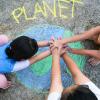
A new collection in the journal Citizen Science: Theory and Practice demonstrates the potential of citizen science to aid in achieving the Sustainable Development Goals (SDGs) and other international agreements and frameworks. The authors call for urgent dialogue between citizen science practitioners, researchers, and decision makers to build partnerships and work together to advance citizen science for a sustainable world.
The 17 SDGs are the blueprint to achieve a better and more sustainable future for all. They address the global challenges we face, including climate change, environmental degradation, and inequality. The achievement of the SDGs depends on the ability to accurately measure progress towards meeting the associated targets based on timely, relevant, and reliable data. Citizen science offers an innovative approach to complement and enhance official statistics. Additionally, citizen science can help raise awareness, mobilize action, and therefore achieve transformative change.
The collection brings together academic papers that offer insights into the contributions of citizen science to the SDGs and other international frameworks. The call for abstracts for this collection attracted 40 submissions, from which 21 papers were reviewed and accepted for publication.
“The interest in contributing to this collection reflects the importance and popularity of Citizen Science,” notes Dilek Fraisl, a researcher in the Novel Data Ecosystems for Sustainability Research Group of the Advancing Systems Analysis Program, who is leading the collection. “We received high-quality submissions from a diverse community, including citizen science researchers and practitioners, National Statistical Offices (NSOs), and international organizations, from both the Global North and South.”
Core themes that run across the set of diverse papers include monitoring and data collection, and the transformative potential of citizen science. The collection also reflects on the progress achieved in the scientific literature and through practical implementation over the past few years.
An example of a paper showcasing the potential of citizen science for monitoring the SDGs is the paper by Proden et al (2023), to which Fraisl contributed together with Linda See, who is also associated with the Novel Data Ecosystems for Sustainability Research Group at IIASA.
“This paper focuses on the views and experiences of the official statistics community, including representatives from NSOs, on citizen science data, along with the opportunities and challenges that these data present,” explains See. “Despite the widely recognized value of citizen science for monitoring the SDGs, we have discovered a conspicuous lack of awareness with this approach among members of the official statistics community.”
The collection serves as a comprehensive compilation, gathering the latest research, findings, and practical recommendations from a diverse set of actors. Additionally, it explores the development of this emerging field of study, providing a roadmap for future research and proposing tangible actions. It is worth noting that, even after eight years of pursuing the SDGs, nearly half of the 92 environmental SDG indicators still lack data. The collection demonstrates that citizen science has vast untapped potential for driving progress towards achieving the SDGs and other international frameworks, highlighting its capacity for collaborative problem solving.
“With this collection, we call for stronger cooperation between all citizen science actors, and for the Citizen Science Global Partnership (CSGP), to help bridge the gap between the citizen science and official statistics communities and stakeholders. We urge the official statistics community to consider the inclusiveness and relevance of their practices and encourage funders to reassess their strategies, to go beyond short-term pilot studies, and to provide genuine financial support to citizen science initiatives focused on monitoring and achieving sustainable development,” concludes Fraisl.
Notes:
CSGP is a network-of-networks that seeks to promote and advance citizen science for a sustainable world. Launched in December 2017 at the UN Science-Policy-Business Forum on the Environment, the partnership brings together existing networks of citizen science researchers and practitioners with advisory boards representing policy, business, and community-based perspectives.
Citizen Science: Theory and Practice is an international peer-reviewed journal focused on impacts and effective practices associated with public participation in scientific endeavors in all disciplines and across the globe. This open-access journal is a publication of the Citizen Science Association.
References
Fraisl, D., See, L., Campbell, J., Andrianandrasana, H., Danielsen, F. (2023). Special Collection: Contributions of Citizen Science to the SDGs and International Development Frameworks. Citizen Science: Theory and Practice https://theoryandpractice.citizenscienceassociation.org/collections/contributions-of-citizen-science
Fraisl, D., See, L., Campbell, J., Danielsen, F., Andrianandrasana H. (2023). Editorial: The Contributions of Citizen Science to the United Nationals Sustainable Development Goals and Other International Agreements and Frameworks. DOI: https://doi.org/10.5334/cstp.643
News

22 July 2024
Are sustainable aviation fuels truly sustainable?

17 July 2024
Forests endure as carbon sink despite regional pressures

16 July 2024


